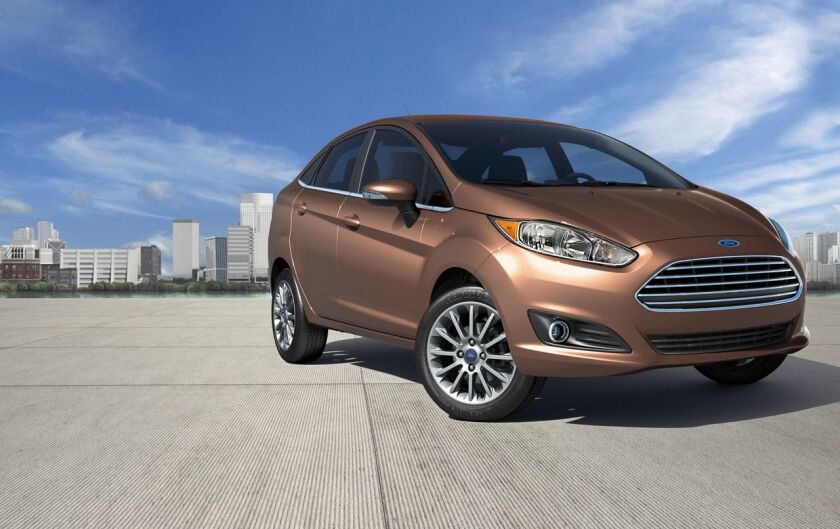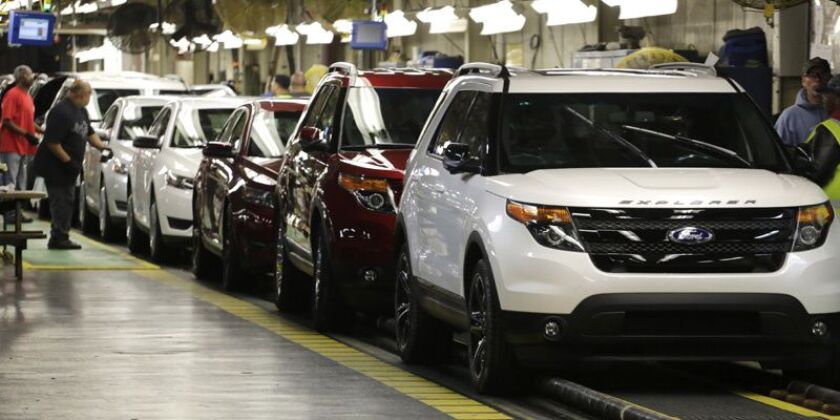Chicago does not think of itself as a city that makes cars. That would be Detroit. Or Belvidere.
But it is. Chicago has been turning out automobiles for almost a century, at Ford’s Chicago Assembly Plant on Torrence Avenue.
The plant began putting together Model Ts in 1924 and has been producing automobiles ever since, lately employing 5,000 workers in three shifts, running seven days a week, completing a shiny new vehicle about every minute.
OPINION
We were so pelted with news last week, between the Korean War abruptly ending and the various thrashings of the president, it was easy to overlook an event that would have been considered dramatic if the world weren’t churning so vigorously around it:
Ford is going to stop making cars.
For the most part.
The company’s first quarter report, issued last Wednesday, contains a variety of news: revenue up 7 percent, the investor meeting will be Sept. 26.
Then toward the bottom of the first page, Ford drops the bomb:
“By 2020, almost 90 percent of the Ford portfolio in North America will be trucks, utilities and commercial vehicles. Given declining consumer demand and product profitability, the company will not invest in next generations of traditional Ford sedans for North America. Over the next few years, the Ford car portfolio on North America will transition to two vehicles — the best-selling Mustang and the all-new Focus Active crossover coming out next year.”
So just as Henry Ford used to say that customers could buy a Model T in any color they liked so long as it was black, soon you’ll be able to buy any Ford car you want, provided it’s a Mustang. Or a Focus.
Goodbye Taurus, the company’s beanish breakthrough of 30 years ago.
What does this mean?
Honestly, not much. “SUV” is really just a marketing term for a style of boxy car with athletic aspirations somehow baked in. People seldom use the term in daily living. Nobody says, “Kids, climb in the SUV, we’re getting ice cream!” The news isn’t so much that Ford will stop making cars, but that we’re all going to start calling SUVs “cars.” That is, if we haven’t already.
I had breakfast with a friend Saturday. He mentioned he had just bought a car — through Costco, to add another layer of unsettling change.
“What kind of car?” I asked.
“A RAV4,” he said. I did not huffily inform him that a RAV4 is not a car, but an SUV. I myself often call our Honda Odyssey a “car” because calling it a “van,” while technically correct, would suggest that I drive a van, maybe even evoking that Saturday Night Live sketch with Chris Farley as a motivational speaker who lives in a van by the river. A fate that might still await me. I’ve got the van.
So we’ll still drive “cars” even if Ford no longer makes what we currently think of as cars, the way people still “dial” phones even if they’ve never seen a rotary dial phone.
“Car,” remember, is a very old word; at least 700 years old. It once described something pulled by horses. Then locomotives. It isn’t going away. “SUV” will fade and be forgotten, steering wheels might go away, but self-driving electronic cars will still scoot silently around our streets.
The news is still notable; it shows that Ford is still ahead of the curve, and has been for a while. I toured Ford’s Torrence Avenue plant about a dozen years ago, and was very impressed. Two memories stick out. First, the industrial robots — hundreds of them, like giant prehistoric birds, probing into the guts of cars with their inquisitive beaks, drawing back, pausing as if puzzled, then diving in again, sending off showers of sparks.
Second, the ingenuity of the manufacturing system: Ford knew it costs money just to hold inventory — that every day a bolt sits on a shelf adds some fraction of a penny to the cost of a car. So the plant had a “Three Hour Rule” — it was supposed to have only enough stock on hand to keep operating for three hours. Parts being installed on cars in the afternoon had arrived that morning.
Now those parts will be installed almost exclusively on SUVs. Which we’ll call “cars.”







